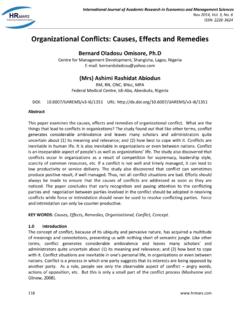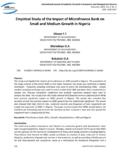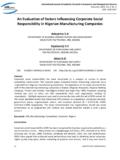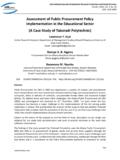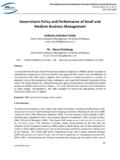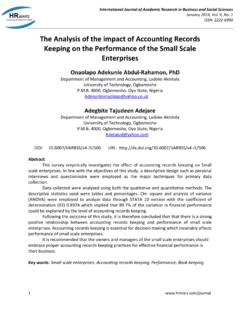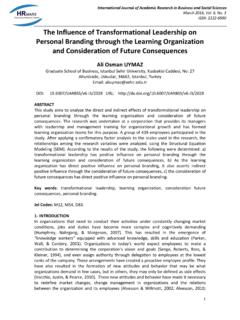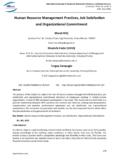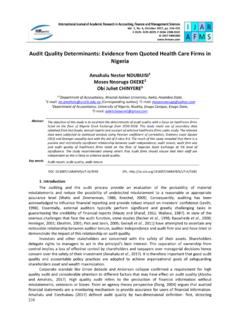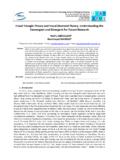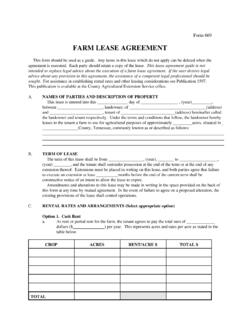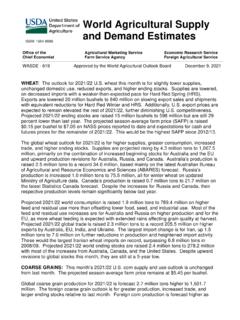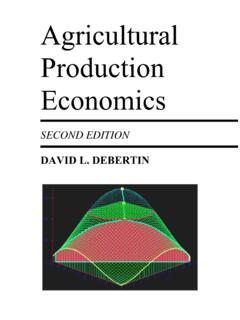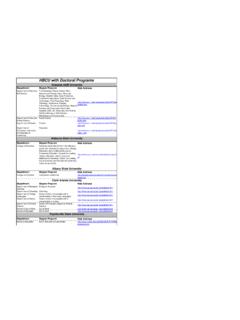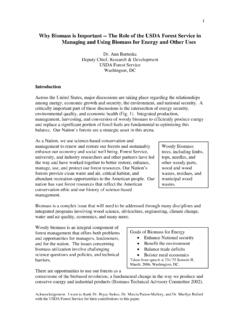Transcription of Socioeconomic Factors Influencing Agricultural Production ...
1 International Journal of Academic Research in Economics and Management Sciences 2015, Vol. 4, No. 3 ISSN: 2226-3624 43 Socioeconomic Factors Influencing Agricultural Production among Cooperative Farmers in Anambra State, Nigeria Theresa Ukamaka Anigbogu ( ) Department of Cooperative Economics and Mgt, Nnamdi Azikiwe University (NAU), Awka, Nigeria. Email: Obianuju Emmanuela Agbasi Department of Cooperative Economics and Mgt, Nnamdi Azikiwe University (NAU), Awka, Nigeria. Email: *Ikechukwu Moses Okoli Department of Cooperative Economics and Mgt, Nnamdi Azikiwe University (NAU), Awka, Nigeria. *Corresponding Author: Email: DOI: URL: Abstract The study was informed by the perceived declining food Production in Nigeria which was supported by literature.
2 Food Production in Nigeria no longer keep with population growth. Thus creating a wide gap between the demand and supply of food. To investigate the identified problem of perceived declining food Production in Nigeria, the study specifically investigated the influence of Socioeconomic characteristics of the cooperative farmers on Agricultural Production as proxied by the farmers output levels using a regression model of the ordinary least square. Findings revealed that eight (Age, Educational Qualification, Farming Experience, Farm Size, Income, Seedling Obtain, Fertilizer Obtain and Fertility of the land) out of the fourteen coefficients of the variables included in the model are significant.
3 Twelve of the coefficients have positive relationship with the cooperative farmers output. While four of the coefficients have inverse relationship with cooperative farmers output. The joint effect of the explanatory variable in the model account for of the variations in the Factors affecting the cooperative farmers output. The study therefore recommends among others that the government should provide Agricultural credit to farmers, initiate and support mechanized farming. This will help improve the productivity and output of the farmers in Anambra state. The government should also encourage the farmers by improving on Agricultural Infrastructural Facilities because it has been identified as one of the major challenges faced by the cooperative farmers in improving Agricultural Production .
4 Key words: Agricultural Production , Cooperative farmers, Regression model, Farmers output, Anambra state. I. INTRODUCTION The Nigeria economy has been described by researchers as an agrarian economy where agriculture plays crucial role in the nation's Socioeconomic transformation, apart from being the source of food to the people, it is the greatest employer of labour and provider of incomes, sources of industrial International Journal of Academic Research in Economics and Management Sciences 2015, Vol. 4, No. 3 ISSN: 2226-3624 44 raw materials, and export products for foreign exchange earnings, and has in the past been an important provider of resources for investments in other sectors of the economy (Anyanwuocha, 2006).
5 In the literature of Agricultural Production in Nigeria, agriculture has been described as the most important economic sector in terms of its contribution to the GDP, after oil (Bakare, 2013; Enoma,2010). For example, the sector contributed about 41% of the country s Gross Domestic Product (GDP), employed about 65% of the total population and provided employment to about 80% of the rural population(Bakare, 2013; African Development Fund, 2005). Despite the contribution of agriculture to Gross Domestic Product in Nigeria, food Production has not been able to keep pace with population growth. As stated by Abdulrahaman (2013), food Production at subsistence level especially in third world countries does not keep with the pace of rapidly growing population, when compared to advanced or developed economy.
6 Abdulrahaman (2013) further cited that in Nigeria, as at 2000, the total population estimate stood at 123,337,800 million people, this number increased to 170,123,700 in the year 2012, which shows a growth rate of between 2000 to 2012 (Mondi index, 2012). This figure provides an indication that Nigerian population is among the fast growing population in the world. On the other hand food Production increases marginally at a rate lower than population growth rate. With this growing rate can Nigeria sustain its population food demand, by providing sufficient quantity and quality of food for all (Abdulrahaman, 2013)? Therefore, in this era of structural reforms where the government and other stake holders are devising blue prints for bridging the gap between the demand and supply of food, cooperative, more precisely Agricultural cooperatives have been used as a platform for improving Nigeria agriculture for years now.
7 The cooperative is one of the organizational forms for conducting legitimate business in a marketing economy like Nigeria. According to International Cooperative Alliance, in Nwankwo (2008) , cooperative is an autonomous association of persons united voluntarily to meet their common economic, social and cultural needs and aspirations through a jointly owned and democratically controlled enterprise. Nwankwo (2008) further stated that a cooperative is an independent enterprise, promoted, owned and controlled by members to meet their needs. As an enterprise, cooperatives are active in markets locally, nationally and worldwide. The cooperative has been described as a veritable approach for mobilizing disparate small farm holders in the rural areas to increase their income and enjoy the benefit large scale Production (Ibe, 2002).
8 At the introduction of formal cooperative in Nigeria over seven decades ago, cooperative was used as a platform for improving Agricultural Production and farmers income. The cooperative according to Ofuebe (1992) is one of the most effective vehicles for organizing modernized rural Production , which has become one of the most important preconditions for efficient mobilization of Production resources and accelerated rural progress. Uchendu (1998) stated that the original impetus for the introduction of cooperative was in agriculture more precisely the marketing of Agricultural products to help fetch better prices and income for cocoa farmers in the Western part of Nigeria. Statement of the Problem This study was informed by the declining food Production in Nigeria.
9 Food Production in Nigeria no longer keep with population growth. Thus creating a wide gap between the demand and supply of food (Abdulrahaman, 2013). This is evident in the observed food deficit and the upward trend in the price of food stuff in the market over the years (Igwe and Esonwune, 2011; African Development Fund, 2005; CBN, 2002). The resulting effect of this imbalance between demand for and supply of food is malnutrition, poverty and deteriorating living conditions (Igwe and Esonwune, 2011; Nadozie and Ibe, 2000; Eze, 2009). Against this background, the growth of Nigeria economy with reference to agriculture has been import driven rather Production driven. Consequently, there is a growing advocacy for improving Nigeria Agricultural Production so as to achieve sustainable food security.
10 According to Eze (2009) a lot of effort has been directed at finding appropriate institutions for organizing millions of small scale farmers towards achieving food security (through increased food Production ) and Agricultural International Journal of Academic Research in Economics and Management Sciences 2015, Vol. 4, No. 3 ISSN: 2226-3624 45 cooperative society has been described as the appropriate vehicle for harnessing and polling the resources of millions of small holder farmers producers together to enjoy the benefit of large scale Production . The Agricultural sector in Nigeria, (Daramola, 2004) is made up of forestry, livestock, fishing, food and cash crops such as yams, cassava, maize, cocoa, groundnut and oil palm.
